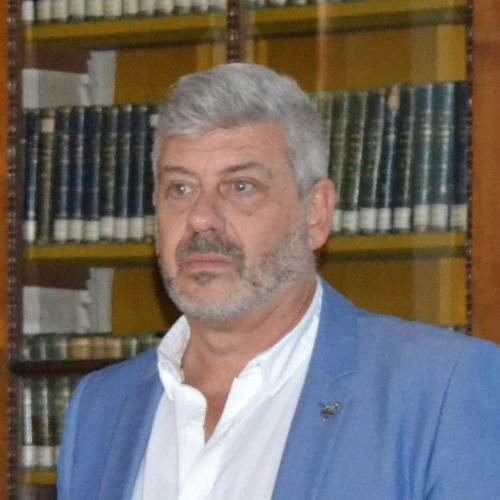
ÁNGEL
MORILLO CERDÁN
Catedrático de universidad
Department: Prehistoria, Historia Antigua y Arqueología
Faculty: Geografía e Historia
Area: Archaeology
Research group: Grupo de investigación sobre ciudades romanas
Email: amorillo@ucm.es
Personal web: https://www.ucm.es/angelmorillocerdan/
Doctor by the Universidad Autónoma de Madrid with the thesis Lucernas romanas en la región septentrional de la Península Ibérica 1996. Supervised by Dr. Carmen Fernández Ochoa.
A University graduate in Geography and History from the Faculty of Philosophy and Arts of the Universidad Autónoma of Madrid (1987/88 academic year). In 1996 he obtained a doctorate in Geography and History (specialization in Archaeology) from the Universidad Autónoma of Madrid. Between the years 2000 and 2007 he was Professor of Archaeology at the Universidad de León, and joined the Universidad Complutense of Madrid in November 2007. Since February 21 2017 he has been Archaeology Full Professor. His research is focused on the understanding of various aspects related to the process of the Roman establishment in the northern region of the Iberian Peninsula and the Roman military presence in Hispania. This is evidenced in his many studies of ceramics, numismatics, Late Imperial fortifications, Roman baths, Roman navigation and commerce in the north and northwest of the Iberian Peninsula. The analysis of perishable products in the archaeological record of Roman Hispania (Ephemeral Archaeology or Archaeology of the Ephemeral) has been recently added to this catalogue. Particularly noteworthy are the studies on Roman Military Archaeology in Spain, a study area that was introduced into the conceptual discourse of Spanish archaeology through the conferences organized under that title. His work carried out particularly on the Roman camps are also worth mentioning, both in their architectural and contextual definition, paying special attention to the Late Republican and Early Imperial Roman military sites of Herrera de Pisuerga (Palencia), Astorga (León), El Pedrosillo (Badajoz) and, above all, the camps of León and Cáceres el Viejo (Cáceres). His overall cross-sectional studies on the Cantabrian wars or the Sertorian conflict must also be mentioned. His scientific works include several more monographs in collaboration with various researchers and also many scientific publications, book chapters, papers in indexed magazines of recognized prestige, both Spanish and foreign, as well as presentations and communications at conferences. This scientific focus is endorsed by his participation in various research projects on different aspects of Archeology of Roman Spain (thermal baths, numismatics, rural settlements, etc.), having also directed four projects of the National R&D&I Research Plan as MR on Roman camps and cultural transfer processes, in addition to other projects granted by the Junta de Castilla y León. Among the international projects it is worth mentioning Frontiers of the Roman Empire (2006-2007), within the Culture 2000 Program. He has also been scientific director and organizer of, among others, the two Congress of Roman Military Archaeology in Hispania (Segovia, in 1998, and León, in 2004. In September 2006 he organized the International Congress of Roman Frontier Studies in León, which was held for the first time in Spain (published in 2009). To date, he has directed 4 doctoral theses and numerous minor theses and final degree projects of young researchers who have become University teachers and who have also joined his research projects on the Roman world. From October 2015 to 2019 he was director of the Archivo Español de Arqueología journal, belonging to the CSIC. He has participated in various ANECA commissions for project evaluation, Juan de la Cierva contracts and six-year research periods. He has completed five six-year research periods. Since 2021, he has been director of the Department of Prehistory, Ancient History and Archaeology of the UCM. He is responsible for around twenty surveys and excavations, both in Castilla y León and in Extremadura and in the Comunidad de Madrid. In this last region he has intervened through Public Archeology projects in the Late Antique and Islamic site of La Cabilda (Hoyo de Manzanares) in recent years (2019-2022).












